|
|
|
Sort Order |
|
|
|
Items / Page
|
|
|
|
|
|
|
| Srl | Item |
| 1 |
ID:
100467
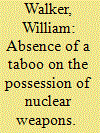

|
|
|
| 2 |
ID:
100478


|
|
|
|
|
| Publication |
2010.
|
| Summary/Abstract |
The following article refers to the current debate about state personhood opened by Wendt's claim for a treatment of states as real persons in order to prevent the reductionist argument that states only are treated 'as if' they were persons. By understanding phenomena like states consistently as structures - as 'structures of corporate practice' - we argue that there is a possibility to escape from the situation dually framed by Wendt. This alternative is constituted by a tripartite pragmatist ontological model that consists of actors, structures of corporate practice, and processes. After having presented our view of the debate and its central problems in a first step, we will set forth our model and its implications for the study of international relations in a second and third step.
|
|
|
|
|
|
|
|
|
|
|
|
|
|
|
|
| 3 |
ID:
100477
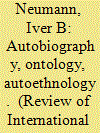

|
|
|
| 4 |
ID:
100476


|
|
|
| 5 |
ID:
100464


|
|
|
| 6 |
ID:
100474


|
|
|
|
|
| Publication |
2010.
|
| Summary/Abstract |
Within the academy we are taught to look for silence - as a noun. We are counselled to find gaps in the literature or empirical case studies that have yet to be researched in order to bring our own voice to the issues that they raise. But, there is a tension with the other face of silence, when it assumes the form of a verb. Silence and silencing have therefore been integral motivators for the entire spectrum of 'critical' literature within international studies, not only to show what cannot be spoken or thought about within international studies but also, at times, how this can be a deliberate political practice. But there remains a hope. The hope is that the catalyst for transformation - not merely change - is within that which we already know and that which we already have the ability to articulate or to speak. But should we take these assumptions for granted? It is at this precise point where the concerns of Richard K. Ashley with dissidence can combine with the conceptual provocations of the case of the Pirahã people of western Amazonia to generate some uncertainty about the revelations that 'critical' scholarship often wants to provide.
|
|
|
|
|
|
|
|
|
|
|
|
|
|
|
|
| 7 |
ID:
100482


|
|
|
|
|
| Publication |
2010.
|
| Summary/Abstract |
To date, studies of international politics have little space for time. In this article, I argue that time is constitutive of the international system by offering a genealogical historical sketch of the coeval rise of territorial state sovereignty and Western standard time (consisting of seconds, minutes, and hours). Sovereignty is rightly a foundational concept of both the international system and the field of International Relations (IR), but the emergence of the contemporary method of reckoning time during the Enlightenment also supported the project of political modernity, and is thus critical to IR. The genealogical motive of the sketch is to understand what have become naturalised, global social conventions as historically contingent, cosmopolitical phenomena that resulted from significant socio-political efforts and conflicts. I locate 'sites' where modern sovereignty emerged and explicate contemporaneous processes, factors, and events implicated in the rise of modern time at those sites. In doing so, I outline how particular modes of understanding space and time were bred in Western Europe, spread around the world via colonialism, and embedded during the eras of global war and post-colonialism. I conclude by contrasting current challenges to territorial state sovereignty with Western standard time's untrammelled global hegemony.
|
|
|
|
|
|
|
|
|
|
|
|
|
|
|
|
| 8 |
ID:
100480
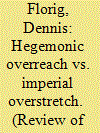

|
|
|
|
|
| Publication |
2010.
|
| Summary/Abstract |
The concept of hegemonic overreach proposes a revision of Kennedy's notion of imperial overstretch that puts more emphasis on policy choices of hegemonic states. Previous long-cycle theories of hegemonic breakdown have focused on the contradiction between the hegemon's growing military-political commitments and its slipping economic capability relative to rising challenger states. Another key contradiction in US foreign policy is between the imperatives of hegemony and the ideology of messianic mission developed long before the US stepped up to its current global role. Hegemonic overreach, driven by this sense of messianic mission, is a major cause of failure in US foreign policy.
|
|
|
|
|
|
|
|
|
|
|
|
|
|
|
|
| 9 |
ID:
100481
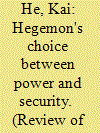

|
|
|
|
|
| Publication |
2010.
|
| Summary/Abstract |
After the Cold War, US strategists have suggested four strategies for the hegemon: hegemonic dominion, selective engagement, offshore balancing, and multilateralism. Rather than debating which strategy is the best for the US at all times, this article focuses on examining which policy is more likely to be chosen by the hegemon - the US - under different strategic conditions. Through a neoclassical realist argument - the power-perception hegemonic model, I argue that US foreign policy depends on how US policymakers perceive US hegemonic status in the international system. Under rising and stable hegemony, selective engagement and hegemonic dominion are two possible power-maximisation strategies given the weak security constraints from the system. Under declining hegemony, offshore balancing and multilateralism are more likely to be chosen by US policymakers to pursue security because of a resumed security imperative from anarchy. US policy toward Asia after the Cold War is a case study to test the validity of the power-perception hegemonic model. I conclude that US policymakers should prepare for life after Pax-Americana, and early implementation of offshore balancing and multilateralism may facilitate the soft-landing of declining US hegemony.
|
|
|
|
|
|
|
|
|
|
|
|
|
|
|
|
| 10 |
ID:
100468
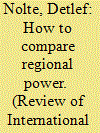

|
|
|
|
|
| Publication |
2010.
|
| Summary/Abstract |
Although the concept of regional power is frequently used in International Relations (IR) literature, there is no consensus regarding the defining characteristics of a regional power. The article discusses different theoretical approaches that address the topic of power hierarchies in international politics and make reference to the concept of regional power. Marking differences as well as common ground with the more traditional concept of 'middle powers', the article outlines an analytical concept of regional powers adequate for contemporary IR research. The analytical dimensions of the framework may be employed to differentiate regional powers from other states and to compare regional powers with regard to their power status or relative power. Furthermore, the article investigates the possible repercussions of the rise of regional powers for international politics and discusses the probable importance and functions of regional governance structures for regional powers.
|
|
|
|
|
|
|
|
|
|
|
|
|
|
|
|
| 11 |
ID:
100475


|
|
|
| 12 |
ID:
100472
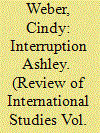

|
|
|
|
|
| Publication |
2010.
|
| Summary/Abstract |
Rather than reading the work of Richard K. Ashley as iconic - as some dead, stable image used to signify the whole of post-modern or post-structural International Relations (IR) in a single swoop - this article considers Ashley's work as an interruption to the discipline of IR (mainstream and critical). In so doing, the article suggests that what is important about Ashley's work is how it creates a thinking space where it is possible to think again about international politics, about international theory, about what Ashley's interruption itself permits and limits and about how this interruption unfolds and sometimes folds back on itself.
|
|
|
|
|
|
|
|
|
|
|
|
|
|
|
|
| 13 |
ID:
100479
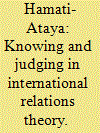

|
|
|
|
|
| Publication |
2010.
|
| Summary/Abstract |
This article addresses the notion of reflexivity in international theory through an attempt to transcend the dichotomy between knowledge and judgement. It intends to demonstrate that neither 'philosophical' nor 'scientific' approaches to world politics can reconcile cognitive and evaluative claims, but that such an endeavour may be envisaged within a certain conception of knowledge, science and facts. A comparison of Morton Kaplan's approach with Hans Morgenthau's and Kenneth Waltz's suggests what kind of theoretical alternatives can bring together these two seemingly incommensurable orders of discourse under a unified, foundationally reflexive epistemology.
|
|
|
|
|
|
|
|
|
|
|
|
|
|
|
|
| 14 |
ID:
100463


|
|
|
| 15 |
ID:
100470


|
|
|
|
|
| Publication |
2010.
|
| Summary/Abstract |
The article inquires into the conditions of effective leadership of states in international politics, and develops a framework for the study of so-called (new) regional powers such as Brazil, China, India, and South Africa in processes of regional institution-building. Various theoretical strands will be discussed as to the requirements of effective leadership in international affairs. Most importantly, the relationship between power, leadership and hegemony will be outlined. It is argued that the connection between leadership and hegemony is one of co-constitution. Leadership is necessarily based on hegemony, while hegemony can only be sustained through leadership. Furthermore, it will be shown that both leadership and hegemony are essentially political in character, whereas power has no such insinuation but has to be translated into leadership and hegemony through discursive means. Finally, the analysis asks for the preconditions of leadership in East Asia, using China's and Japan's roles in East Asian regionalism as an illustration.
|
|
|
|
|
|
|
|
|
|
|
|
|
|
|
|
| 16 |
ID:
100471
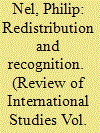

|
|
|
|
|
| Publication |
2010.
|
| Summary/Abstract |
Regional powers of the Global South are perceived to be agents of change. But what exactly is the nature of the change that they want? This article argues that there is some continuity between the goals of the current generation of regional leaders and that of their predecessors. The current generation tend to have more confidence in their ability to effect the redistribution of wealth, prestige, and power in the global political economy, though, and tend therefore to be more integrationist than the first generation of post-colonial leaders. The goal of redistribution is premised on a more fundamental unfinished struggle of developing countries, one that Brazil, India, and South Africa in particular have taken up. This is the struggle for recognition of developing countries as full and equal partners in the society of states, but also as states with specific development needs that are too easily ploughed-under in the spurious universality promoted by the developed North. The struggle for recognition focuses on inclusive multilateralism and 'non-indifference' towards the development needs of the Global South. Using recent contributions to the theory of recognition, the article interprets these two goals as linked to the unfinished struggle against disrespect and humiliation.
|
|
|
|
|
|
|
|
|
|
|
|
|
|
|
|
| 17 |
ID:
100469


|
|
|
|
|
| Publication |
2010.
|
| Summary/Abstract |
Regional powers are often conceived of as 'regional leading powers', states which adopt a cooperative and benevolent attitude in their international relations with their neighbours. The article argues that regional powers can follow a much wider range of foreign policy strategies in their region. Three ideal-typical regional strategies are identified: empire, hegemony, and leadership. The article is devoted to a theory-led distinction and clarification of these three terms, which are often used interchangeably in the field of International Relations. According to the goals pursued, to the means employed, and to other discriminating features such as the degree of legitimation and the type of self-representation by the dominant state, the article outlines the essential traits of imperial, hegemonic, and leading strategies and identifies sub-types for better classifying hegemony and leadership.
|
|
|
|
|
|
|
|
|
|
|
|
|
|
|
|
| 18 |
ID:
100466
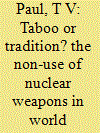

|
|
|
|
|
| Publication |
2010.
|
| Summary/Abstract |
The non-use of nuclear weapons since Hiroshima and Nagasaki in 1945 has emerged as a major puzzle in international politics. Traditional International Relations scholarship views this largely as a function of the deterrent relationship that emerged between the nuclear powers, especially during the Cold War era. The fact that nuclear weapons have not been used against non-nuclear states, despite temptations to use them, remains a challenge to the deterrence-only explanation. More normatively oriented scholars have argued that a taboo has emerged against the non-use of nuclear weapons. Nina Tannenwald's book, The Nuclear Taboo is the most comprehensive study on this subject which relies on constructivist logic of inter-subjective taboo-like prohibition in accounting for the puzzle. While I see much merit in Tannenwald's empirical case studies, it is far-fetched to call the non-use largely a function of a taboo-like prohibition. For, taboos by their very nature forbid discussions of their breaking, whereas nuclear states have national military strategies that call for nuclear use under certain circumstances. They have also in many crises situations considered the use of nuclear weapons. I have argued in my book, The Tradition of Non-use of Nuclear Weapons (Stanford University Press, 2009), that a more modest tradition can be given partial credit for the absence of nuclear attacks on non-nuclear states. The tradition emerged because of a realisation of the horrendous effects of nuclear attack (a material fact) which generated reputation costs for a potential user. These reputation costs in turn generated self-deterrence which has helped to create a tradition which is partially restraining nuclear states from using their weapons for anything other than existential deterrence. Unlike Tannenwald, I contend that the tradition is not a strict taboo and hence it can be altered if material and political circumstances compel nuclear states to do so. The recent policy changes that have taken place in nuclear powers such as the US, Russia, UK, and France do not augur well for the tradition as the conditions for atomic use have been expanded to include prevention, pre-emption and other non-proliferation objectives involving rogue states and terrorist groups.
|
|
|
|
|
|
|
|
|
|
|
|
|
|
|
|
| 19 |
ID:
100473


|
|
|
|
|
| Publication |
2010.
|
| Summary/Abstract |
Richard Ashley's writings in the 1980s are central to the production of post-structuralist or 'dissident' scholarship in International Relations (IR). In this article, I use analysis of the standard dissident view of Ashley's writings to examine the interpretive practices through which the community of dissident scholars was produced textually. Dissident 'thinking space' in the discipline was produced in part through the exclusion of Marx, capital and class, despite these being present in Ashley's writings throughout this period. Similar interpretive practices were applied to the writings of Michel Foucault, with similar effects. This exclusion has negative consequences for dissident scholarship, in particular analysis of historicity and the place of capitalism in contemporary world politics. Overcoming these problems requires reading the work of Ashley and other founders of dissident scholarship in a different way are attentive to the silences of thinking space.
|
|
|
|
|
|
|
|
|
|
|
|
|
|
|
|
| 20 |
ID:
100465
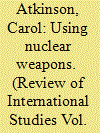

|
|
|
|
|
|
|
|